- Home
- Chris Wraight
The Path of Heaven Page 27
The Path of Heaven Read online
Page 27
Back in the time before the inferno, he had possessed a tutelary, Ianaius. The Intelligence had appeared intermittently as a faint and barely perceptible presence at his side, though it had disappeared long before his last fateful journey with Kalliston to Prospero. It had never been something of cardinal importance to him. In the years afterwards, he had never tried to summon the spirit to his side again, but just then, for the first time, he found himself missing the subtle warmth of its diaphanous shade.
He moved to the platform and leaned over it heavily, pressing his palms against the wet stone. If he kept leaning, leaning, leaning, he would topple forwards, plunging into it head-first. Perhaps then the surface would break, and he would submerge within the matter of it, becoming one with the bones of the station. Perhaps then the eternal pain would cease, cooled by the oil-dark liquid. Perhaps he would become a tutelary himself, a twittering afterthought to plague the dream-worlds of men.
‘I would have fought the Wolves,’ he breathed aloud. ‘I would not have let them defile the sacred spaces.’
The air ahead of him, between his face mask and the platform’s surface, trembled. It felt as if his fingers were sinking into the stone. He blinked several times and tried to push away, but failed.
Below, far below, the rift circled. It roared, on the edge of hearing. The waters foamed.
Things began to change. He felt warm in his every sinew. He narrowed his eyes, and the vision before him blurred and wobbled.
There was a world, dark, lashed with lightning in many hues. There was a tower, immense beyond physics, thrust clear of the plates of the earth like an erupting arrowhead. He saw Intelligences dancing in the starlight, spewing out their fragments of esoterica as jests. The land beneath bubbled and altered, morphing with every rapid sunrise into something new, something tormented.
He wanted to pull back then. A terrible fear caught him by the stomach, kneading it, making him cold again.
Below, the rift circled.
He saw fleets of ships, their prows sapphire and their flanks bronze, pulling out of the warp, drifting over the tower. He saw robed figures out on the planes, milling around the base of the tower. He saw the Intelligences clustering like angels in the night sky, drawn to the tower. It was all the tower. He could not take his eyes from it. His head dipped further.
He cannot live.
That was when he saw the reflection – broken up, like images in a hall of mirrors. The faces gazed in different directions, hazy through the facets of crystal lenses, antagonistic, unaware, as confused and as lost as he himself. All images had the one, lone eye – on some faces, ringed with fire, on another, a mournful human orb, on others, a daemonic pit of insanity.
He cannot live.
His brothers were on the world, walking across its lightning-glossed landscape, making pilgrimage towards the black gates.
‘No,’ he breathed, out loud, his head dropping further. ‘They were dead. They were all dead.’
They stood in their crimson battleplate, their robes of azure, carrying staffs topped with rearing serpent-heads, insects, bird-beaks. They spoke to one another, mournfully, resentfully, and they looked up into the skies, searching for the source of their sudden transformation.
‘I would have known it. I would have sensed it.’
The shattered god was not yet amongst them. He was only there in reflections, in dreams, in the gathering dust. They did not see him, not fully. They were working. They were studying. One of them led the others now. His armour was the most familiar, marked with the sign of the raven, as ornate as it had been when he had been magister templi and the greatest of them all.
‘No, you cannot cure it,’ Arvida found himself saying, desperately. ‘No, not that way. Do not try that way.’
He reached out, as if he could pluck the figures from their world of spells and fling them back into the void. As he did so, the image sheared away, breaking into shards and spinning apart.
Beyond it was another vision, far colder, far more remote.
He saw a galaxy of a million worlds. He saw vast fleets ply the darkness, black with the patina of age, their plasma drives leaking toxic sludge across the void. He saw manufactories churning smog into rain-grey skies. He saw lines of huddled mortals, billions of them, processing into the grinning maws of immense cathedrals where frenzied hymns were sung to a skull-faced corpse shackled to the remnants of a pain-engine. He saw books being burned, tossed on to enormous pyres and denounced, even as the ancient vehicles that carried men through the stars faltered for lack of knowledge. He saw the tortures, the fears, the despairs, the endless grinding, wearing, deadening labour, the gathering might of xenos terror, and under it all, the gurgling chortle of voices from the deepest recess of the human mind...
He was Corvidae, of the caste of seers. This was not a vision like the other, removed only in space. This was far into the future, a future every soul around him was striving to build.
‘No,’ he whispered, and pushed himself away.
Below, the rift churned.
He struggled to breathe. He staggered clear of the platform, shaking his hands clean of the liquid that coated them. He blundered into the wall, snapping his head back.
Then he was at the portal again, somehow blindly through, limping out. The visions crowded his mind, driving out the fear of the Change, driving out everything.
‘Not this,’ he blurted, staggering into another wall, reeling away from it, limping onwards like a drunkard.
The further he went, the easier it became. His vision cleared. He saw the shadows ahead of him, inky and oblique. The warmth faded, settling down to the void-chill of the abandoned station.
He sank down, hearts beating, palms sweaty. He had to find the Khan, or Yesugei, or one of the keshig. He had to get off the station. They all had to. All that remained was the warp, the poison, the heart of all corruption, leaking up the long shaft and staining their souls to the black.
He lives.
The knowledge made him want to scream aloud. Every certainty was gone now, every allegiance. Could he be found? What price had he paid for clinging to life? And the others, the others…
They are all alive.
That was too much. He started off again, pushing to his feet and moving faster. The dark pressed in on him, smothering the thin light of his helm lumens, trying to choke him out.
He kept moving. He kept going.
Down below, uncaring as eternity, the warp rift wheeled in the dark.
Nineteen
Torghun reached the bridge after his brothers, disturbed from a meditation that had been difficult to sustain. The place was in disarray. Sanyasa had drawn his blade and was shouting out orders. Others of the sagyar mazan worked their way through the lower stations, examining every mortal as they went.
‘What is happening?’ Torghun asked. He felt thick-headed, as if he had not slept for many days.
‘You did not hear the alarms?’ Sanyasa was in full armour. All the others were in full armour. ‘My khan, the fleet is on a war-footing, and we have a problem.’
Torghun stared up at the Xo Gamail’s overhead viewports. White Scars battleships were powering ahead, gliding through the void in wide formation. Their gunnery arrays were open and primed, their void shield aegis glittering. ‘You did not summon me earlier?’
Sanyasa was striding over to a rank of sensorium stations. ‘We have been busy, my khan.’
It was then that Torghun saw the bodies, three of them, lying face-down amid the many crew-stations. The ship’s engine hum was strained, a throttled beat that missed its rhythm. They were already out of position – far in front of where they had been ordered to remain.
Torghun assumed the command throne and began to access the myriad data systems that shunted through the vessel’s arteries. ‘We are above the designated plane. Bring us down.’
Sa
nyasa turned back to him. ‘You may try.’
‘Do you not see the order-scheme?
Sanyasa didn’t move. ‘Study the wider picture.’
Torghun hesitated, then accessed the tactical hololiths, the system read-outs, the diagnostic relays. The Xo Gamail was close to the flagship, treading a dangerous path amid the weaving courses of the big warships. They should have been a long way back, out of harm’s way.
Then he saw the engine readings. They were far into the red-zone. They were going far too fast, burning far too much fuel, wearing down the protective reactor-shell.
‘This course will lose us containment,’ Torghun said, seeing the danger. ‘Shut it down.’
‘We cannot,’ said Sanyasa. ‘The cycle has gone too far.’
Out in the void loomed the hunt-lean profile of the greatest warship in the fleet, the spear-prowed Swordstorm. It was coming about, ponderously, its immense lance configuration snaking with barely contained energies.
‘Get us off this course,’ said Torghun, looking for more options. ‘Get us down further.’
‘If it could have been done,’ said Sanyasa, firmly, ‘it would have been.’
Sanyasa was implacable, holding his ground. The others, Holian, Inchig, Ahm, stood with him, and they were making no attempt to find a solution.
The Swordstorm drew closer.
‘They will not take us,’ said Torghun, understanding at last what had been done. ‘Not now.’
‘I estimate the engines will burn out in ten minutes,’ said Sanyasa. ‘Then we will be dead in the void, target-fodder, even more than we are already.’
He was right. The Xo Gamail was on a suicidal course, out beyond the protective range of the main guns. Torghun could see the first glimmers of enemy location-markers, and could guess how quickly the battlesphere would envelope them. They had been condemned to a futile enough role before, but this was automatic suicide.
‘You see it – there is no choice,’ said Sanyasa, working hard not to sound as if he were over-pressing the point.
For a moment longer, Torghun resisted, searching for another way. Being manipulated was always hateful, especially from a subordinate. He had already made his decision, he had given his orders – they would not contest Shiban’s directive. He did not want to become what he was accused of. Not again.
He slammed his fist into the throne’s arm. There were over a hundred warriors to consider, each one needed, each one capable of killing in the Khan’s name. They had proved that, a thousand times over. In all justice, they were already redeemed.
The Swordstorm had almost finished its turn, after which the mighty thrusters would fire, taking it far beyond range.
Torghun rose from the throne again, shooting Sanyasa a sour look. ‘Give the order. Mortal crew to the saviour-pods, warriors to the shuttle-bays. Do it now.’
Klaxons began to sound, instantly, as if they had long been primed. The bridge erupted into movement as menials, fleet officers and legionaries all began to make their way, quickly but without panic, to the evacuation stations.
Sanyasa nodded his head in acknowledgement. He had not moved yet – they would not stir until Torghun gave them their lead.
He regarded them coldly, but there was no time left for questions, far less for investigation. Witchery ran through the closed atmosphere, fizzing across the cycled air, making him feel both febrile and dangerous.
‘Signal the flagship,’ he said, moving at last. ‘And let us hope they retain more honour than you do.’
The decks passed, one after the other, always descending.
The keshig went first, their pale armour glimmering in the dark. As he travelled, the Khan looked about him, taking everything in, absorbing the detail, isolating points of danger and advantage.
The air tasted foul – filtered through machines that had been inactive for a long time. Every so often he tasted the tang of dry blood.
They had passed the bloodstained rooms already. There had been no bodies, just long smears of dark brown on the metal. In several places there were marks made by carbines, plus the remains of spent cartridges, but no weapons. A few levels further down, even those signs dried up. The chambers were empty, every one of them, scraped clean of life and home to only the endless dark, the cold, the faint creaks of the structure’s massive architecture.
The Khan entered a long hall. He moved his gaze across it, his helm adding in false colour to what the lumen-beams missed. Ranks of smooth-boled pillars marched away into the gloom, glinting as the lights flitted over them. Iron bookcases, many tens of metres high, filled the wallspace, each one stuffed with scrolls and leatherbound tomes. A heavy metal orrery stood in the centre of the floor, listing to one side on a broken axis. Its rings and dials were covered in algebraic script, and jewels marked the position of planetary systems.
Low, long tables sat under the pillars, some covered in the flaking remains of parchment maps. The Khan moved closer to one of them. He reached out to flatten the material, and it cracked along the folds.
Namahi joined him. ‘There are many such rooms,’ he said.
The Khan looked at the charts. The nearest was like no star chart he had ever seen – a riot of swirls and serpentine eddies, backing up, switching over, the courses merging into one another. Various labels had been applied in tiny High Gothic letters: Stratum Aetheris, Stratum Profundis, Viam Sedis, Ocularis Malefica.
‘Warp channels,’ the Khan said. ‘Has the ecumene seen these?’
‘He says they are like those on Herevail. He has pushed deeper.’
‘Yesugei remains with him?’
‘And his guard.’
The Khan nodded. He let the parchment fall and kept walking. ‘Map-makers,’ he said. ‘That is what they call my Father, you know this? The Cartomancer. He was all things to all people.’
Namahi walked alongside him in silence. Like Qin Xa, he was a calm soul.
They reached the end of the hall. It terminated in a colonnade of thin, perilously tall columns. After that was a balcony, overlooking a deep shaft. The gulf was over twenty metres across, and its base was lost in the shadows. A stair led down into it, clinging to the near wall, zigzagging back and forth. On the far side of the abyss rose another iron wall, covered in a mass of overlapping pipes and cables.
The Khan stood on the balcony. As he peered over the edge, he felt a nagging sense of familiarity.
‘I have seen this before,’ he said.
Down below, a squad of White Scars was negotiating the stairs, the soft glow of lumens following them down. Their bootfalls echoed in the emptiness, gradually fading as they descended.
‘Some light,’ the Khan said.
Namahi reached for a flare, unscrewed the canister and threw it over the edge. The charge tumbled for a while, then exploded, flooding the walls of the chasm. It dropped away slowly, dragging its aura of short-lived brilliance with it to the bottom.
The pipework ran down a long way, hundreds of metres. The workings of enormous machines were embedded among the metalwork walls – pistons, flywheels, riveted gears. Massive chains clanked gently against one another, shackled to levers buried amid tangles of thick cabling. The complexity, even to one used to the spectacle of Imperial starships and hive spires, was impressive.
The Khan watched the flare fall all the way, capturing the outlines of further devices before it dropped beyond sight. As he did so, the familiarity suddenly became clear.
‘I remember this.’
The far-off past, back when he had first been taken to Terra. He had walked the endless corridors of the Palace, exploring the city-world from its highest spires to its deepest pits. He had been free to roam, and none had dared hinder a primarch in his Father’s house. During that time he had seen the Emperor only rarely, for He had been called away by the duties of the Great Crusade, and when returned to the Palace was
habitually occupied with the thousand cares of empire.
It had been a day in winter, the flanks of the mountains white and glaring. The Khan had roved far into the deep places, treading the paths of the Palace foundations. Earth-movers were still active down there, gnawing their way through the roots of the peaks, hollowing out what would one day become the greatest and most secure of the Palace’s hidden halls. The Sigillite’s people were everywhere, mingling with squads of Legio Custodes in crimson robes and golden armour.
It had not taken much to elude them – Jaghatai had been doing that all his life. He kept travelling, ever further into the heart of the earth, the lights dying out, the rock unworked, the earthbreakers dormant and unmanned.
There had been a shaft there, just like this one. Cables had run down its entire length, just as they did here. Great energy coils had been sunk into the walls, feeding engines of unknown purpose and power.
At the very base of it all, thick with darkness, he had spied a last unfinished hall, immense beyond anything else in that assembled vastness. All the cables led there, terminating over an empty stage. Scaffolds straddled the edifice, lost in the dusty occlusion, heavy with haulage claws and chain-lifts.
He had not noticed his Father’s presence until too late, for that was the way with Him – He would be there, then not there, like light on water.
‘What is this place?’ the Khan had asked.
‘The end of the Crusade,’ the Emperor had replied.
And that had been all he ever learned. Now, unimaginably far away, out in the furthest tracts of cold space, here it was again – the shaft, the machines, the power coils, identical in every detail.
He was about to give the order to descend, when his helm comm-bead crackled into life.
‘Khagan,’ came the message from Jubal. ‘They are here.’
So soon.
He curled his fingers over the balcony’s railing in frustration. ‘Understood,’ he sent back. ‘I return.’ He closed the link and turned to Namahi. ‘Yesugei continues?’

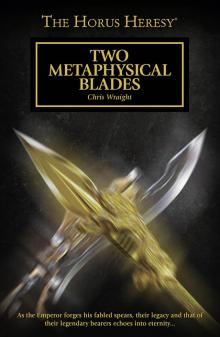 Two Metaphysical Blades
Two Metaphysical Blades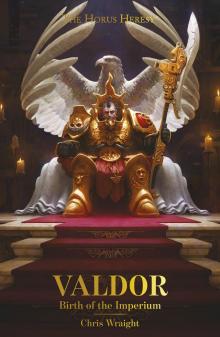 Valdor: Birth of the Imperium
Valdor: Birth of the Imperium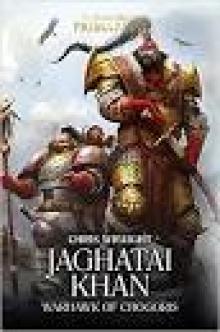 JAGHATAI KHAN WARHAWK OF CHOGORIS
JAGHATAI KHAN WARHAWK OF CHOGORIS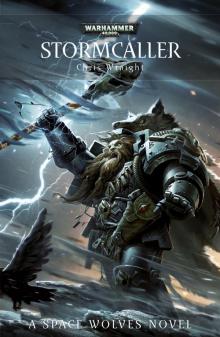 Stormcaller
Stormcaller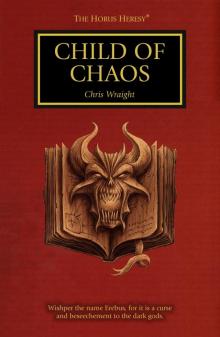 Child of Chaos
Child of Chaos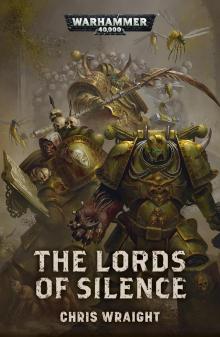 The Lords of Silence
The Lords of Silence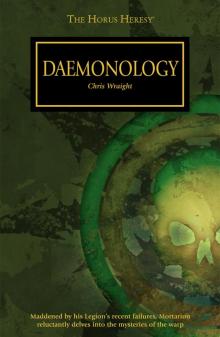 Daemonology
Daemonology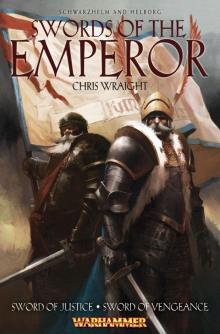 Swords of the Emperor
Swords of the Emperor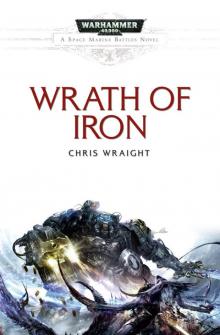 Wrath of Iron
Wrath of Iron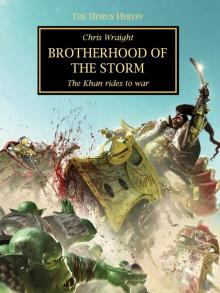 Brothers of the Storm
Brothers of the Storm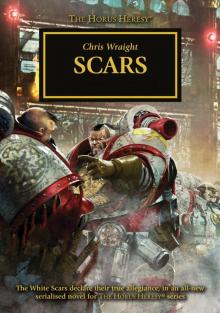 Horus Heresy: Scars
Horus Heresy: Scars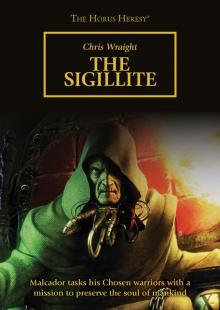 The Sigillite
The Sigillite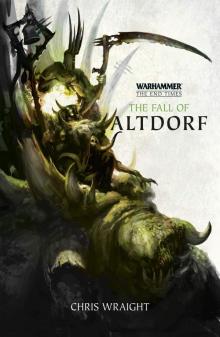 The End Times | The Fall of Altdorf
The End Times | The Fall of Altdorf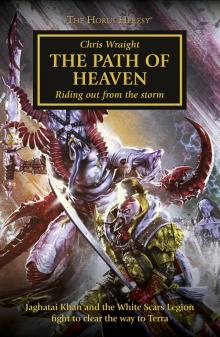 The Path of Heaven
The Path of Heaven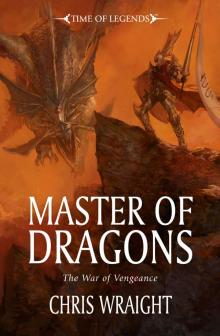 Master of Dragons
Master of Dragons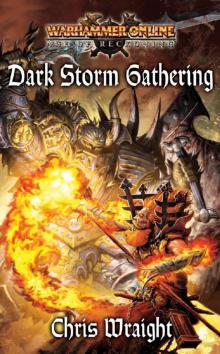 WH-Warhammer Online-Age of Reckoning 02(R)-Dark Storm Gathering
WH-Warhammer Online-Age of Reckoning 02(R)-Dark Storm Gathering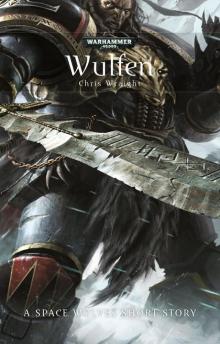 Wulfen
Wulfen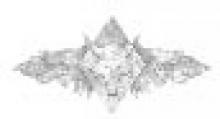 Battle Of The Fang
Battle Of The Fang Onyx
Onyx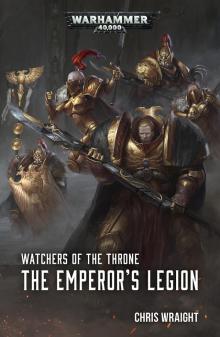 Watchers of the Throne: The Emperor’s Legion
Watchers of the Throne: The Emperor’s Legion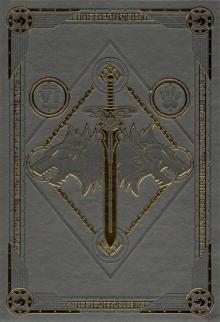 Leman Russ: The Great Wolf
Leman Russ: The Great Wolf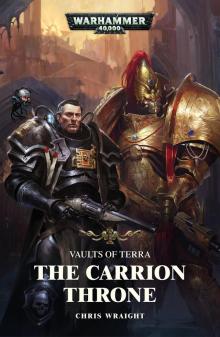 Vaults of Terra: The Carrion Throne
Vaults of Terra: The Carrion Throne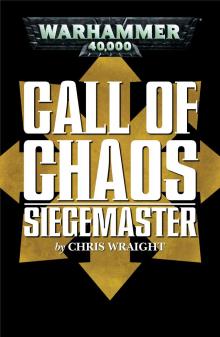 Siegemaster
Siegemaster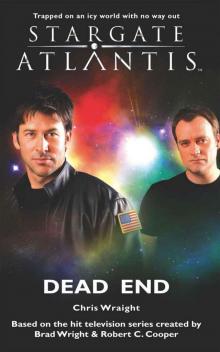 STARGATE ATLANTIS: Dead End
STARGATE ATLANTIS: Dead End Scars
Scars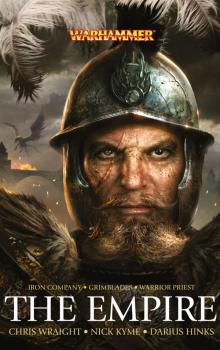 The Empire Omnibus
The Empire Omnibus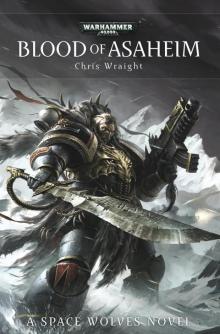 Blood of Asaheim
Blood of Asaheim